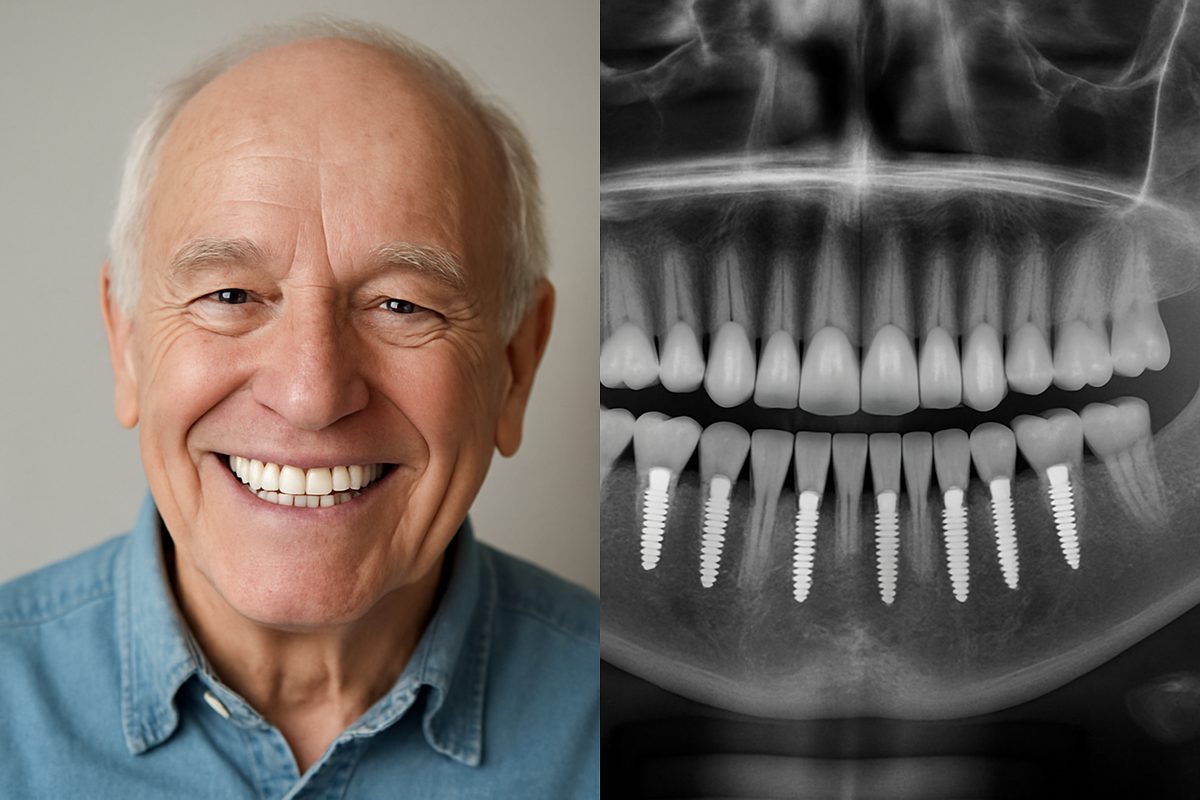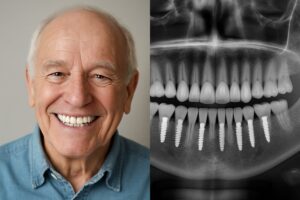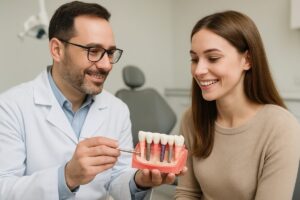Full teeth implants are a way to replace an entire arch of missing or failing teeth with teeth that are fixed to dental implants. This post helps people wondering if full teeth implants or implant-supported dentures are the right choice. You’ll learn what full teeth implants are, who is a good candidate, the main types of full-arch solutions, what to expect during treatment, benefits and risks, basic cost factors, and questions to ask your dentist before deciding. If you live near Albuquerque, many patients consider full teeth implants in Albuquerque for long-term stability and improved chewing.
What are full teeth implants?
Full-arch implant restorations replace all the upper or lower teeth using multiple implants as anchors. They differ from single implants, which replace one tooth, and from traditional dentures, which sit on the gums. You may hear terms like full-arch, implant-supported denture, overdenture, All-on-4, or fixed hybrid prosthesis. All of these fall under the umbrella of full teeth implants and aim to restore function and appearance more reliably than removable dentures.
Who is a good candidate for full teeth implants?
General health and medical considerations
Good overall health helps implant success. Patients with uncontrolled diabetes, certain immune disorders, or heavy smoking may face higher risks. Controlled medical conditions often still allow implants, but your dentist and physician should coordinate care. Stopping smoking before and after surgery improves healing.
Oral health and bone requirements
Adequate bone and healthy gums are important for implant support. Bone loss after missing teeth is common; bone grafting or sinus lifts may be needed to create a stable base. Modern practices use CBCT 3D imaging to measure bone precisely and plan implant placement, helping determine if full teeth implants in Albuquerque are possible for you.
Lifestyle and expectations
Consider your goals and willingness to maintain implants. Full-arch solutions restore chewing, speech, and appearance, but they require daily cleaning and regular dental checkups. If you want fixed teeth that feel like natural teeth and you can commit to maintenance, you may be a strong candidate.
Types of full-arch solutions
All-on-4 and All-on-6
These are fixed prostheses supported by four or six implants. They often allow for immediate temporary teeth and provide strong chewing force. The number of implants depends on bone and bite needs.
Implant-supported removable dentures
Overdentures snap onto implants and can be removed for cleaning. They are a good option when cost or hygiene access is a concern but still offer far more stability than traditional dentures.
Fixed hybrid prosthesis
A hybrid holds a full set of teeth on a metal substructure attached to implants. It’s fixed in the mouth and offers durable, natural-feeling results that are easier to clean than removable options.
What to expect during the treatment
Consultation and planning use exams, 3D CBCT scans, and digital planning to design your restoration. Surgery can include immediate loading (temporary teeth placed the same day) or delayed loading after healing. Recovery usually involves several weeks of healing plus follow-up visits. Long-term maintenance includes daily cleaning, periodic professional care, and occasional screw or prosthetic maintenance.
Benefits, risks, and longevity
Benefits include improved stability, better chewing, and bone preservation. Risks include infection, implant failure, and prosthetic wear. With good care, many full teeth implants last 15 years or more; bone health, technique, and materials all affect longevity.
Cost and financing considerations for full teeth implants
Costs vary by number of implants, grafting, lab work, and materials. Insurance often covers parts but not full implant treatment; many practices offer financing or payment plans to spread cost.
How to decide: are full teeth implants right for you?
Checklist: Are you in good general health? Is bone adequate or graftable? Do you want fixed teeth and commit to maintenance? Ask your dentist about their implant experience, success rates, technology used, and expected timeline.
Why choose a practice with advanced technology?
Technologies like CBCT 3D imaging, CEREC, and digital planning improve implant accuracy and outcomes. Precision Dental Care and Dr. Craig Steichen bring decades of implant experience and modern tools to help evaluate candidacy for full teeth implants in Albuquerque. If you’re ready to learn if full teeth implants in Albuquerque are right for you, book a consultation to get a personalized exam, CBCT scan, and treatment plan.




